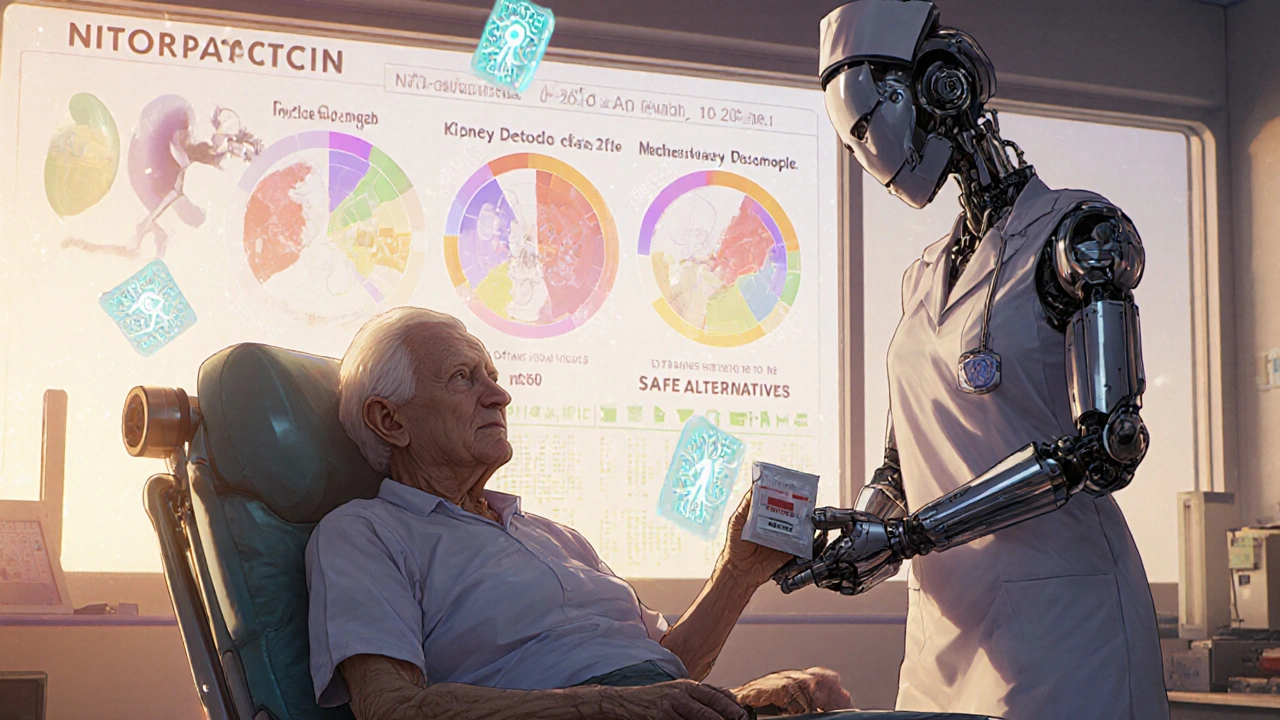 Nov, 18 2025
Nov, 18 2025
Every year, millions of people in the UK get a urinary tract infection (UTI). Most are women. Most are treated with antibiotics. Nitrofurantoin is one of the most common prescriptions. But is it always the best choice? And what happens if it doesn’t work-or causes side effects? You might be wondering: nitrofurantoin vs. alternatives. Let’s cut through the noise and look at what actually works, what doesn’t, and who should take what.
What is nitrofurantoin, really?
Nitrofurantoin is an antibiotic designed to treat uncomplicated bladder infections. It’s not meant for kidney infections or severe cases. The drug works by damaging bacterial DNA inside the urinary tract. It stays mostly in the urine, which is why it’s so effective for lower UTIs but useless for infections higher up.
It comes in two forms: macrocrystals (Macrobid) and monohydrate (Macrodantin). Both are equally effective. The main difference? Macrobid is taken twice a day. Macrodantin is taken four times a day. That’s why most people end up on Macrobid-it’s easier to stick with.
It’s cheap. It’s widely available on the NHS. And for healthy adults with simple bladder infections, it’s often the first-line choice. But it’s not perfect. About 1 in 10 people get nausea, vomiting, or stomach cramps. A small number develop headaches or dizziness. Rarely, it can cause lung or nerve damage if taken long-term. That’s why it’s not recommended for people over 65 or those with kidney problems.
Trimethoprim: The NHS’s other go-to
If your GP doesn’t prescribe nitrofurantoin, they’re likely prescribing trimethoprim. It’s the other top choice for simple UTIs in the UK. Trimethoprim blocks bacterial folate production. It’s taken once or twice a day for three days. Easy. Effective. Cheap.
But here’s the catch: resistance is rising. In some parts of England, more than 20% of E. coli-the most common UTI bug-is now resistant to trimethoprim. That means it doesn’t work for 1 in 5 people. If you’ve taken trimethoprim before and it didn’t help, your GP will probably avoid it next time.
Nitrofurantoin has lower resistance rates. That’s why many doctors now prefer it as a first option. But if you’re allergic to sulfa drugs or have a history of blood disorders, trimethoprim might be safer for you.
Fosfomycin: The one-dose wonder
Imagine taking a single tablet and being done. That’s fosfomycin. It’s a broad-spectrum antibiotic that kills bacteria by disrupting their cell walls. One sachet dissolved in water, taken as a single dose. No pills for days. No remembering schedules.
It’s especially useful if you’re pregnant, have kidney issues, or just hate taking multiple pills. It’s also a good option if you’ve had repeated UTIs and need to avoid long-term antibiotic exposure.
But it’s not a magic bullet. It’s more expensive than nitrofurantoin or trimethoprim. It’s not always stocked in pharmacies. And while it works well for simple infections, it’s less reliable for recurrent cases. Studies show it cures about 80% of cases-slightly lower than nitrofurantoin’s 85-90%.
Cephalexin and other cephalosporins
When your GP suspects a more complicated infection-maybe you’ve had a UTI before, or you’re diabetic-they might reach for cephalexin. It’s a cephalosporin, a class of antibiotics that work against a wider range of bacteria.
Cephalexin is taken twice a day for 7 days. It’s more likely to work if your infection is stubborn or if you’ve already tried nitrofurantoin and trimethoprim. But it’s also more likely to cause side effects: diarrhea, rashes, or even yeast infections. And it’s not recommended for people with penicillin allergies.
It’s not a first-line treatment. But if your infection isn’t clearing up, it’s often the next step. Some GPs use it when they suspect a kidney infection (pyelonephritis), which nitrofurantoin can’t treat.

Amoxicillin and co-amoxiclav: The old-school options
Amoxicillin used to be the default for UTIs. But resistance has made it unreliable. Today, it’s rarely used unless you’re pregnant or have specific allergies.
Co-amoxiclav (amoxicillin + clavulanic acid) is stronger. It’s used when bacteria are resistant to regular amoxicillin. But it’s also more likely to cause severe diarrhea and gut upset. It’s usually reserved for hospital settings or complicated cases.
If you’ve taken amoxicillin for a cold or ear infection recently, your GP will avoid it for your UTI. It’s not effective against the bacteria that cause most UTIs anymore. And overuse has made it worse.
When nitrofurantoin doesn’t work
What if you’ve taken nitrofurantoin for three days and you’re still burning when you pee? Or you’re feverish? That’s not normal. It means one of two things: either the infection is more serious, or the bacteria are resistant.
Don’t wait. Go back to your GP. They’ll likely send a urine sample for culture. That tells them exactly which bacteria are causing the infection-and which antibiotics will kill them.
Until then, drink plenty of water. Avoid caffeine and alcohol. Use a heating pad. These won’t cure the infection, but they’ll make you feel better while you wait.
Don’t try to self-treat with leftover antibiotics. That’s how superbugs grow.
Who should avoid nitrofurantoin?
Nitrofurantoin isn’t safe for everyone.
- People over 65-higher risk of nerve and lung damage
- Those with kidney disease (eGFR under 45)-the drug builds up in the body
- Pregnant women in the last few weeks before delivery-risk of newborn jaundice
- Anyone allergic to nitrofurantoin or with a history of liver problems
- People with glucose-6-phosphate dehydrogenase (G6PD) deficiency-can trigger severe anemia
If you fall into any of these groups, your doctor will pick something else. Trimethoprim or fosfomycin are usually safer.

What about natural remedies?
Cranberry juice? D-mannose? Probiotics? People swear by them. But science says something different.
Cranberry juice might help prevent UTIs in some women-but only if you drink it every day, and only if it’s unsweetened. It won’t cure an active infection.
D-mannose is a sugar that stops E. coli from sticking to the bladder wall. Some small studies show it might help with mild symptoms. But no large trials prove it works as well as antibiotics. It’s not licensed in the UK as a treatment.
Probiotics? They may help reduce recurrence after antibiotics. But they don’t replace them.
If you have symptoms, don’t delay. Antibiotics work fast. Natural remedies don’t.
Choosing the right antibiotic for you
There’s no single best antibiotic for every UTI. The right choice depends on:
- Your age and kidney function
- Whether you’re pregnant
- Your allergy history
- Whether you’ve had UTIs before
- Local resistance patterns
Here’s a simple guide:
| Scenario | Best Option | Why |
|---|---|---|
| First-time UTI, under 65, healthy kidneys | Nitrofurantoin | High cure rate, low resistance, stays in urine |
| First-time UTI, trimethoprim resistance suspected | Nitrofurantoin | More reliable than trimethoprim in many areas |
| Pregnant (first or second trimester) | Nitrofurantoin or fosfomycin | Safer than trimethoprim in early pregnancy |
| Pregnant (last 2 weeks before delivery) | Fosfomycin or cephalexin | Nitrofurantoin avoided due to newborn jaundice risk |
| Over 65 or kidney problems | Fosfomycin or trimethoprim (if no resistance) | Nitrofurantoin too risky |
| Recurrent UTI, failed first-line | Urine culture + targeted antibiotic | Need to know exactly what bug you’re fighting |
What happens after treatment?
Most people feel better in 24-48 hours. But finish the full course-even if you’re fine. Stopping early breeds resistant bacteria.
After treatment, drink lots of water. Pee after sex. Wipe front to back. Avoid bubble baths and scented products. These simple steps cut recurrence risk by up to 50%.
If you get three or more UTIs in a year, ask your GP about preventive options. Low-dose antibiotics taken daily or after sex can help. So can vaginal estrogen for postmenopausal women.
Bottom line
Nitrofurantoin is still one of the best options for simple UTIs. But it’s not the only one-and it’s not always the right one. Trimethoprim is cheaper but less reliable. Fosfomycin is convenient but pricier. Cephalexin is for tougher cases.
Your best move? Talk to your GP. Bring your history. Ask about local resistance. Don’t assume the first antibiotic they give you is the only option.
UTIs are common. But they shouldn’t be treated like a one-size-fits-all problem. The right antibiotic saves time, reduces side effects, and stops superbugs from growing.
Can I take nitrofurantoin if I’m pregnant?
Nitrofurantoin is generally safe during the first and second trimesters of pregnancy. It’s often preferred over trimethoprim because it doesn’t interfere with folic acid. But it’s not recommended in the last 2-4 weeks before delivery because it can cause jaundice in newborns. Always check with your midwife or GP before taking any antibiotic during pregnancy.
Is nitrofurantoin better than trimethoprim?
In many areas of the UK, yes-because bacterial resistance to trimethoprim has grown. Nitrofurantoin has a higher cure rate for simple UTIs and is less likely to contribute to antibiotic resistance. But if you’re allergic to nitrofurantoin or have kidney problems, trimethoprim may be safer. Your doctor will pick based on your health history and local resistance patterns.
Why does my GP sometimes prescribe a 7-day course instead of 5 days?
Nitrofurantoin is usually taken for 5 days. But if you’re older, have a history of recurrent UTIs, or your infection is slow to improve, your GP may extend it to 7 days. This gives the antibiotic more time to fully clear the infection and reduces the chance of it coming back.
Can I drink alcohol while taking nitrofurantoin?
Yes, alcohol doesn’t interact with nitrofurantoin. But drinking while you have a UTI isn’t a good idea. Alcohol dehydrates you, which makes it harder for your body to flush out the infection. It can also irritate your bladder and make symptoms worse. Stick to water.
What if nitrofurantoin makes me feel sick?
Nausea and stomach upset are common with nitrofurantoin. Take it with food or milk to reduce this. If it’s severe or you’re vomiting, call your GP. You might need a different antibiotic. Don’t stop taking it without talking to them-unfinished courses lead to resistant infections.
Are there any long-term risks with nitrofurantoin?
Long-term use (months or years) can rarely cause lung damage or nerve problems. That’s why it’s only prescribed for short courses-usually 5 to 7 days. If you’re on it for longer, your doctor should monitor you closely. For most people treating a simple UTI, this isn’t a concern.
Ashley Miller
November 19, 2025 AT 03:19Of course the NHS loves nitrofurantoin-cheap, easy to prescribe, and nobody has to think. Meanwhile, Big Pharma is quietly lobbying to keep us on antibiotics like it’s 2005. Next they’ll say caffeine cures cancer. At least admit we’re just managing symptoms while the superbugs throw a rave in our bladders.
Sherri Naslund
November 20, 2025 AT 17:35lol so we’re just gonna keep dosing ppl with antibiotics like they’re energy drinks? i mean sure, nitrofurantoin ‘works’-until your gut flora turns into a warzone and you start hallucinating your bladder is talking to you. d-mannose is literally sugar that tricks bacteria into thinking they’re on a date. why’s that not in the NHS formulary? oh right-no patent. capitalism is a urinary tract infection and we’re all just peeing into the wind.
Martin Rodrigue
November 21, 2025 AT 20:31While the article presents a clinically sound overview of first-line urinary tract infection therapeutics, it notably underemphasizes the importance of antimicrobial stewardship in the context of global resistance patterns. Nitrofurantoin, despite its favorable pharmacokinetic profile in the urinary tract, remains subject to regional variability in resistance, particularly in regions with high fluoroquinolone usage. Furthermore, the omission of pharmacogenomic considerations-such as G6PD deficiency screening prior to prescription-represents a missed opportunity for personalized medicine integration in primary care protocols.
darnell hunter
November 22, 2025 AT 06:29Let’s be honest: if you’re not using American-approved antibiotics, you’re just playing Russian roulette with your kidneys. Nitrofurantoin? Fine. But why not just go straight to cephalexin like we do in the States? We don’t wait for culture results-we treat, we win. This whole ‘local resistance patterns’ nonsense is just Europe’s way of avoiding real medicine. If it works in the U.S., it should work everywhere.
Bette Rivas
November 23, 2025 AT 12:11One thing the article doesn’t fully address is the role of urine culture in guiding therapy, especially for recurrent or persistent infections. While nitrofurantoin is excellent for uncomplicated cystitis in otherwise healthy individuals, its utility diminishes significantly when the pathogen is not E. coli-such as Enterococcus faecalis or Klebsiella pneumoniae. In these cases, even a simple urine dipstick with microscopy and subsequent culture can prevent unnecessary treatment failures and reduce the risk of progression to pyelonephritis. For patients with recurrent UTIs, I strongly recommend a urologic workup, including imaging and possibly cystoscopy, especially if symptoms persist after appropriate antibiotic courses. Prevention strategies-like post-coital voiding, cranberry supplements (not juice), and vaginal estrogen in postmenopausal women-are underutilized and evidence-based.
prasad gali
November 23, 2025 AT 12:16From an infectious disease epidemiology standpoint, the empirical selection of nitrofurantoin over trimethoprim aligns with the 2023 UK HCAI resistance surveillance data, which shows trimethoprim resistance exceeding 25% in 12 of 14 NHS regions. However, fosfomycin’s pharmacodynamic profile-specifically its concentration-dependent bactericidal activity and post-antibiotic effect-makes it superior for intermittent dosing regimens in high-risk populations. The clinical efficacy gap between fosfomycin (80%) and nitrofurantoin (85–90%) is statistically insignificant in non-immunocompromised hosts, yet cost-effectiveness models favor nitrofurantoin. The real bottleneck is not therapeutic efficacy-it’s pharmacy inventory management and prescriber inertia.
Paige Basford
November 23, 2025 AT 17:56Just wanted to say I’ve had 3 UTIs this year and nitrofurantoin made me so nauseous I thought I was gonna puke my stomach out. My doctor switched me to fosfomycin and honestly? It was a game-changer. One pill, done. No more 5-day pill schedules. I still drink water like it’s my job, wipe front to back, and even started taking D-mannose after reading about it here. I’m not saying it cures it, but it helps me feel like I’m doing something. Also, I don’t drink alcohol anymore during a UTI-turns out my bladder hates it. Just sharing my experience, hope it helps someone!
Ankita Sinha
November 24, 2025 AT 21:35So many people think antibiotics are magic pills, but the real hero here is hydration. I used to get UTIs every other month-then I started drinking 3 liters of water a day, peeing after sex, and skipping the scented wipes. No more antibiotics for 18 months. And yes, I still take D-mannose as a backup, not a cure. But seriously, if you’re not drinking enough water, no antibiotic will fix that. Your body is not a machine that needs fixing-it’s a system that needs care. Stop blaming the bacteria. Start listening to your own body.